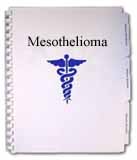|
Mesothelioma and Lung Cancer News - Return to Menu
Mystery Unraveled: How Asbestos Causes Cancer
ScienceDaily (June 30, 2010) — More than 20 million people in the U.S., and many more worldwide, who have been exposed to asbestos are at risk of developing mesothelioma, a malignant cancer of the membranes that cover the lungs and abdomen that is resistant to current therapies. Moreover, asbestos exposure increases the risk of lung cancer among smokers. For the past 40 years researchers have tried to understand why asbestos causes cancer.
The answer appears in a study published in the current issue of the Proceedings of the National Academy of Sciences, U.S.A., Drs. Haining Yang and Michele Carbone at the University of Hawai'i Cancer Research Center led a research team that included collaborators at New York University, University of Chicago, University of Pittsburgh, San Raffaele University of Milano, and the Imperial College in London.
These researchers addressed the paradox of how asbestos fibers that kill cells could cause cancer, since a dead cell should not be able to grow and form a tumor. They found that when asbestos kills cells, it does so by inducing a process called "programmed cell necrosis" that leads to the release of a molecule called high-mobility group box 1 protein (HMGB1). HMGB1 starts a particular type of inflammatory reaction that causes the release of mutagens and factors that promote tumor growth. The researchers found that patients exposed to asbestos have elevated levels of HMGB1 in their serum. Therefore, they state that it may be possible to target HMGB1 to prevent or treat mesothelioma and identify asbestos-exposed cohorts by simple HMGB1 serological testing.
In the article, the researchers propose that by interfering with the inflammatory reaction caused by asbestos and HMGB1, it may be possible to decrease cancer incidence among cohorts exposed to asbestos and decrease the rate of tumor growth among those already affected by mesothelioma. Drs. Yang and Carbone, the lead authors, state that to test this hypothesis, they are now planning a clinical trial in a remote area in Cappadocia, Turkey, where over 50% of the population dies of malignant mesothelioma. If the results are positive, the approach will be extended to cohorts of asbestos-exposed individuals in the U.S.
This research emphasizes the role of inflammation in causing different types of cancers and provides novel clinical tools to identify exposed individuals and prevent or decrease tumor growth. The researchers question if it will be possible to prevent mesothelioma, like colon cancer, simply by taking aspirin or similar drugs that stop inflammation. They are about to test this hypothesis.
The article is authored by Haining Yang, Zeyana Rivera, Sandro Jube, Masaki Nasu, Pietro Bertino and Michele Carbone at the University of Hawai'i Cancer Research Center; Harvey I. Pass and Chandra Goparaju at New York University; Thomas Krausz at the University of Chicago; Michael T. Lotze at the University of Pittsburgh; Guido Franzoso at the Imperial College of London, U.K.; and Marco E. Bianchi at the University of San Raffele Milano, Italy. It will be published online in the Proceedings of the National Academy of Sciences U.S.A. the week of June 28 2010, and later in print. The study was supported by grants from the U.S. National Cancer Institute, and by the Mesothelioma Applied Research Foundation.
Grace Will Settle Asbestos Claims
BYREUTERS
Published: April 8, 2008
The specialty chemicals producer W. R. Grace & Company, which filed for bankruptcy protection in 2001, said Monday that it would settle all present and future asbestos-related personal injury claims, sending its shares up nearly 8 percent.
The settlement includes $250 million in cash to be paid to a trust and deferred payments of $110 million a year for five years beginning in 2019, the company said in a statement. It also includes a deferred payment of $100 million a year for 10 years beginning in 2024. The deferred payments would be backed by 50.1 percent of its common stock.
The agreement contemplates the filing of a plan of reorganization and related documents with the bankruptcy court, Grace said.
“A lot of work remains to be done before we can confirm a plan of reorganization,” the chief executive, Fred E. Festa, said, “but I am optimistic we will be successful in reaching that goal by the end of this year or early in 2009.” Shares of W. R. Grace closed up $1.98 Monday, at $26.83.
COMPANY NEWS; PPG SETTLES ASBESTOS CLAIMS FOR $2.7 BILLION
Published: May 15, 2002
PPG Industries has settled asbestos injury claims for $2.7 billion and will take a charge against earnings of about $500 million, the company said yesterday. The settlement will be paid over the next 21 years by the manufacturing company and at least three-dozen insurers, including the Travelers Property and Casualty Corporation, the company said. Raymond W. LeBoeuf, PPG's chief executive officer, said most of the asbestos claims were the result of the company's 50 percent ownership position in Pittsburgh Corning, a joint venture with Corning Inc., a company that made asbestos pipe insulation before it filed for Chapter 11 bankruptcy protection in April 2000.
|

































